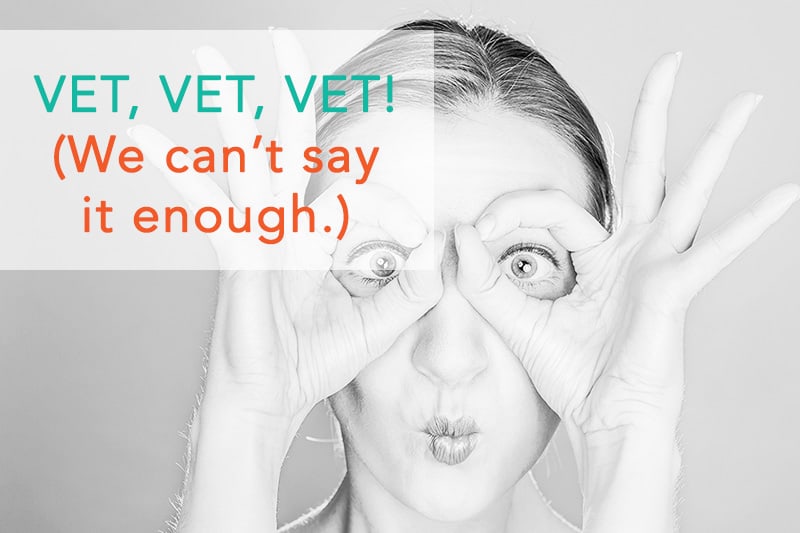How to Protect Yourself Against Badly Behaving Bloggers
By Dalene Heck and Stephanie Yoder
Blogger and other influencer campaigns can be a valuable promotional tool for brands but, as with any relationship, there is the possibility that things can go wrong. We’ve heard of influencers who routinely bail on trips at the last minute, who make outrageous demands, or who don’t produce the agreed upon deliverables. The chance of working with an influencer from hell is always a real fear, and one that even has turned some brands off of influencer marketing entirely.
The travel industry is a prime target for unprofessional behaviour given its plum rewards – new bloggers start everyday, wooed by the opportunity to travel on someone else’s dime. Some seek to ramp up numbers quickly by buying followers, have little concept of what it means to actually produce quality content for clients, and maybe completely ignore some key factors of a campaign which could put brands at risk. And even seasoned blogging vets are not always a walk-in-the-park to work with – as influencer marketing heats up, the plethora of incoming requests for work have turned some beloved bloggers into downright divas.
Want to avoid an influencer marketing disaster? Start with picking the right people, and follow through with taking proper precautions to protect yourself. Here’s what you need to do:
Vet Influencers Properly
Your first line of defense is to properly vet potential influencers. Look at their numbers closely, and ask for case studies that prove their worth. Any content creator worth their salt will happily provide this information. You want people who are honest and open about their numbers. If someone is fudging their stats, or if they refuse to even provide you with the information you ask for, consider those very large red flags. Chances are good that they will act shady in other ways.
(We’ve written in detail about how to vet influencers to make sure they are worth your time and money.)
Big numbers aren’t enough, you also need to evaluate their style, tone, and themes to make sure they are a good fit for your brand. Scroll through their feed and observe their tone and what sort of activities they post about. Is their content well-aligned with your message?
Even a simple internet search can turn up some useful information. Consider the case of @WanderingGirl, a completely fake Instagram account that continued to receive comped hotel and restaurant stays even a year after she was exposed as a fake. If any of those businesses had taken 30 seconds to plug her name into Google, they would have seen immediately that they were being tricked.
Ask Around
You are hiring influencers to do a job, so it’s perfectly justified to ask for references from other brands they’ve worked with. Ask your candidate to supply you with the contact info for a destination or brand they’ve worked with in the past.
You can also take advantage of word of mouth by talking to your peers. Chances are someone you know has worked with the influencer in question before and can give you the inside scoop on their professionalism.
Along the same lines, reach out to your peers for recommendations of content creators they have worked well with. It’s hard to go wrong if you’re starting off with a personal recommendation.
Talk About Everything
When either side makes assumptions, you leave space for expectations to go unmet. Nip this problem in the bud by talking about every possible detail before the project begins. You want to make sure that your expectations are aligned and that you’re not on track for any nasty surprises.
Here are some key points to go over with your influencer:
- Trip itineraries. If travel is involved, make sure that the influencer signs off on your proposed itinerary. This is the chance to head off any potential issues that could affect coverage, like allergies or a fear of heights. Make sure they know what aspects of the trip you will be paying for and what they will need to cover themselves (if anything).
- The deliverables. What are you expecting from them, and when? Be very detailed about your expectations.
- Needs. This is also the time to make sure that your influencer has everything they need to do their job. For example, if you’re expecting real time coverage, make sure they will have the proper internet access to do so. This may mean providing a sim card or mifi device.
- Disclosure Guidelines. Initiate a joint discussion on how to handle federal regulations. How has the blogger dealt with them in the past? How do they propose to do it for this campaign, and are you okay with that? We’ve written a detailed article on what you need to know about the FTC and ASC Guidelines that can be a good jumping-off point for this discussion.
Get it in Writing
The truth about contracts is that they are only as good as your willingness to enforce them. In other words, you can have all the official terms and signatures in the world, but at the end of the day, if you aren’t willing or able to back them up with the full force of a court of law, then they may only be worth the paper they are written on.
In reality, if a small project or campaign goes wrong, you aren’t likely to take it to court. Lawyer fees alone will largely outweigh the few thousand dollars you may hope to recoup. Never mind the value of your time lost or bad press that may result. In most cases, when a marketing relationship turns sour, each party, while seething, likely will just quietly go their separate ways and absorb the loss.
That being said, having an executed agreement in place is still one of the most important things you can do in an influencer marketing relationship. It is a way to ensure that every important detail is discussed and understood prior to a project beginning. It will help to:
- Elevate responsibility. Even if it isn’t entirely likely that a broken contract will result in adverse affects for an influencer (and the influencer knows this), having their signature to terms will arguably still give them a greater impetus to stick to ’em.
- Summarize everything.Don’t let things get lost in your sea of emails or meeting notes. A lot of back-and-forth will happen in approaching work with a blogger, and having a final contract in place will ensure that everyone is on the same page (literally!) going into a campaign. The agreement should include details about fees, payment schedule, clearly defined deliverables for the blogger, and everything that defines what the project entails. Let no item go unsaid.
- Designate rights of content.Who will own the content resulting from this project, and what rights will be assigned? Have this discussion with an influencer ahead of time, and ensure it is spelled out correctly. This is a common point of contention after the fact and is best cleared upfront.
- Protect yourself. Negotiate for payment terms that will hold back at least part of their fee until all deliverables are met. Is this campaign covering an adventurous trip with some risk? Ensure that the influencer has proper travel insurance in place by stating requirements in the contract. Worried about your secret campaign leaking early and losing impact? Include a confidentiality clause. What about limits of liability, and ensuring FTC guidelines are followed? Yes, all of these should be covered in the final agreement (and more). Talk to your lawyer about the specifics.
Meet in Person
In today’s world, almost all communications are handled virtually. “The bonding that naturally happens when people meet face-to-face is lacking. As a result, commitment – trust – is fragile.” via Forbes
Trust, in influencer marketing, is so important. And people generally do a better job if they have a personal connection to any project. If possible, try to meet with influencers in person to form a deeper relationship. If you are planning an influencer trip, meet with them at the beginning or join a meal on the first day to develop that personal connection.
Monitor Coverage
Stay alert to make sure you are getting the coverage you requested. Try not to be too much of a taskmaster, and allow a little bit of slack – if a blogger is caught up in an excellent experience and wants to continue enjoying it, an update may be posted a bit late. A Facebook post that is posted a day late is not the end of the world, as long as it does go up! Remember that they are busy doing what they do best: exploring and creating content to share with their audiences. (It’s particularly important to be understanding if wifi coverage is not universal.)
Lots of brands feel like their work is done once the trip ends, but it’s important to stay on top of the deliverables. Sometimes influencers make mistakes or forget what they’ve committed to, so a gentle reminder can help things stay on track. If there are many missed deadlines and outstanding items, refer back to the contract executed for what recourse you may have.
Protect Yourself, But Don’t Get Paranoid
While it’s not hard to find a nasty influencer horror story, please don’t be put off from working with influencers completely. The benefits of a good influencer campaign far outweigh the fieldwork you have to do to get there.
The vast majority of influencers are good, hard workers who are passionate about their jobs. By taking the steps above, it will be far easier to weed out the bad apples, and only work with people who want to help advance your interests along with their own.
You may also want to read:
Keeping It Legal: Travel Influencer Disclosure Guidelines in North America
The Truth About Influence on Instagram
11 Creative Ways to Work with Influencers: Going Beyond the Press Trip










